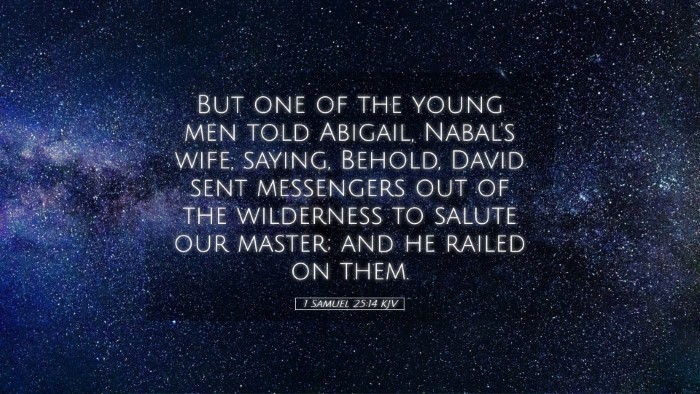Commentary on 1 Samuel 25:14
Verse: "But one of the young men told Abigail, Nabal's wife, saying, 'Behold, David sent messengers out of the wilderness to salute our master; and he railed on them.'
Introduction
This verse finds its place in the narrative surrounding David and Nabal, illustrating a pivotal moment that leads to significant developments in the life of David, Abigail, and the future of Israel's monarchy. The actions of Nabal and the response of Abigail serve to highlight themes of wisdom, folly, and divine providence.
Contextual Background
The context of 1 Samuel 25 is essential for understanding this passage. David, while on the run from Saul, has been living in the wilderness with his men. In need of provisions, he approaches Nabal, a wealthy man with great resources. Nabal's refusal to help and his insulting response sets the stage for the events that follow.
Nabal's Character
Nabal is characterized by his rude behavior and lack of respect. His name means "fool," which is significant as it describes his actions and mindset toward David:
- Matthew Henry comments on Nabal's pride and arrogance, indicating that his wealth led to a disdainful attitude.
- Albert Barnes emphasizes Nabal's folly in rejecting David, a man of renown who has proven his loyalty and strength.
- Adam Clarke notes that Nabal's behavior is representative of those who are wealthy yet devoid of character.
The Role of the Young Man
The young man's report to Abigail is crucial in this narrative:
- This servant acts as a voice of reason, shedding light on Nabal's foolishness and the impending danger posed to them all due to his actions.
- Matthew Henry points out that the young man’s courage in speaking up contrasts sharply with Nabal's cowardice and lack of discernment.
- Barnes notes the importance of this servant's role in preventing disaster, illustrating how divine providence often employs humble instruments to accomplish great ends.
- Clarke charges that this servant embodies wisdom by recognizing the seriousness of the situation and acting to inform Abigail.
Abigail's Wisdom
Abigail's response is marked by remarkable wisdom and discernment:
- Upon hearing the report, Abigail quickly devises a plan to appease David and avert disaster, displaying decisive action characteristic of true wisdom (Henry).
- Barnes reflects on how Abigail's character shines as a contrast to Nabal, demonstrating that true leadership is often found in humility and intelligence rather than arrogance and foolishness.
- Clarke suggests that Abigail's cleverness and foresight are gifts from God, allowing her to navigate a situation with potential for violence.
Theological Implications
Several theological themes arise from this incident:
- Divine Providence: God's hand is evident in how the young man informs Abigail, guiding events toward His intended outcomes.
- The Nature of Wisdom: Abigail’s actions teach that true wisdom often comes from understanding and responding to the circumstances creatively and intelligently.
- Folly vs. Righteousness: The contrast between Nabal’s folly and Abigail’s wisdom serves as a reminder of the consequences of our actions and decisions in opposition to God’s will.
Practical Applications
For pastors, students, theologians, and Bible scholars, the lessons from this passage are profound:
- Discernment is crucial in leadership. Abigail’s response models how to address conflicts with wisdom rather than aggression.
- Recognize the impact of our decisions. Nabal’s arrogance leads to dire consequences, while Abigail's wisdom averted a bloodbath.
- Embrace the role of the faithful servant. The unnamed young man teaches us that every individual has the potential to influence God's plan positively, regardless of their station.
Conclusion
1 Samuel 25:14 provides insights into character, decision-making, and the overarching hand of God in guiding events toward His purposes. The contrasting figures of Nabal and Abigail offer valuable lessons in wisdom and folly, urging readers to seek discernment and act righteously in the face of challenges. These themes resonate throughout Scripture, reminding believers of the significance of their choices and the power of divine intervention in their lives.


